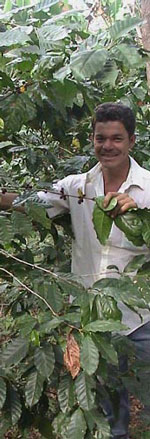DominionSections
Browse Articles
- IndependentMedia.ca
- MostlyWater.org
- Seven Oaks
- BASICS Newsletter
- Siafu
- Briarpatch Magazine
- The Leveller
- Groundwire
- Redwire Magazine
- Canadian Dimension
- CKDU News Collective
- Common Ground
- Shunpiking Magazine
- The Real News
- Our Times
- À babord !
- Blackfly Magazine
- Guerilla News Network
- The Other Side
- The Sunday Independent
- Vive le Canada
- Elements
- ACTivist Magazine
- The Tyee
- TML Daily
- New Socialist
- Relay (Socialist Project)
- Socialist Worker
- Socialist Action
- Rabble.ca
- Straight Goods
- Alternatives Journal
- This Magazine
- Dialogue Magazine
- Orato
- Rebel Youth
- NB Media Co-op
Radio
Fair's Fair
June 24, 2004
Fair's Fair
Marketing and reality in the coffee trade

Eugenio Laguna of the El Porvenir coffee coop in Posoltega, Nicaragua. Rob Gentry
With their seemingly irresistible white cups filled with bitter--sweet froth, Starbucks, assures us that it is a socially--conscious corporation. Once a month in each of the company's 7,834 shops, a Fair Trade 'coffee of the day' is brewed. Fair Trade is an international certification program that ensures coffee farmers a better life. Starbucks openly acknowledges that only a small percentage of the coffee purchased annually is Fair Trade certified, but as Sue Mecklenburg, vice president of business practices for Starbucks proudly states, "100 per cent of the coffee we buy is under conditions that are fair to farmers."
This is the characteristic response of the global coffee chain to the increasing criticism they are facing: they claim to be paying a fair price. True, Starbucks buys coffee at an average price of $1.20 per pound, as opposed to the current global commodity price which currently stands at about $0.50. But a fair price is not Fair Trade. If it were, Starbucks would simply seek Fair Trade certification for their coffee and end the debate.
Fair Trade is a market-based solution to the crisis caused by the collapse of coffee prices, which, according to the Wall Street Journal, "is contributing to social meltdowns affecting an estimated 125 million people--from Central America to Africa." Through the creation of a floor price of $1.26 per pound of coffee and the elimination of middlemen, Fair Trade ensures that more profits go into the hands of small-scale coffee producers. But it is about more than just money.
By allowing small farmers to compete in the global marketplace without being exploited by powerful middlemen, Fair Trade locks in agrarian reforms friendly to small farmers and peasants in the same way that free trade locks in trade policies friendly to large corporations. To be certified as Fair Trade, coffee must be bought from either a cooperative or a democratically run farmers' association. Within such structures, each producer participates in the important decisions concerning distribution. If the producer is part of a cooperative, then he or she actually owns part of the distribution company. Outside the confines of Fair Trade, distribution companies hold the majority of bargaining power and reap the bulk of financial benefits from the trade of commodities such as coffee. Being part of a cooperative or association can be the difference between a farmer being forced to sell his or her small plot of land or being able to keep it and continue making a living. In Nicaragua, the three large coffee cooperatives that presently export from the country were actually formed with the express purpose of maintaining the viability of land reforms introduced by the Sandinista government in the 1980s. In growing the market for cooperatively produced coffee, Fair Trade has thus been instrumental in maintaining agrarian reform in Nicaragua.
Through its emphasis on cooperation, Fair Trade helps to promote organization and development at the community level. While the cooperative or association decides how profits are divided among members, Fair Trade requires that a certain percentage is re--invested into the community. The cooperative focused on Nicaragua's Northern region, Prodecoop, has an education committee that gives kids school supplies and assists farmers and their families in pursuing university degrees and continuing technical education. More importantly, however, a cooperative or association creates an organizational framework within a community and teaches people to work together to solve problems. Where the cooperative provides shelter from market forces, it also opens the lines of communication within a community so that individuals are no longer isolated and forced to wait on government assistance that may never come through. In a country where public investments are minimal and where government policies rarely reflect the needs of the majority, a community's ability to work together can be crucial.
Despite the benefits, life for the Fair Trade coffee farmer remains a struggle. Environmental pressures--such as limited access to water and an increasingly short rainy season--can make cultivation problematic. Furthermore, while the market for Fair Trade coffee has grown steadily, advocates believe that in order for Fair Trade coffee to become mainstream, the large corporations controlling the coffee market such as Starbucks and Proctor & Gamble must get serious about Fair Trade and stop using it simply as a marketing ploy. So while Starbucks' friendly price--which is still six cents short of Fair--is better than nothing, it is certainly short of any true commitment to social justice. Whether the extra pennies fall into the hands of needy farmers is questionable, as is the ability of pennies alone to make the world a better place.
Related articles:
By the same author:
Archived Site
The Dominion is a monthly paper published by an incipient network of independent journalists in Canada. It aims to provide accurate, critical coverage that is accountable to its readers and the subjects it tackles. Taking its name from Canada's official status as both a colony and a colonial force, the Dominion examines politics, culture and daily life with a view to understanding the exercise of power.